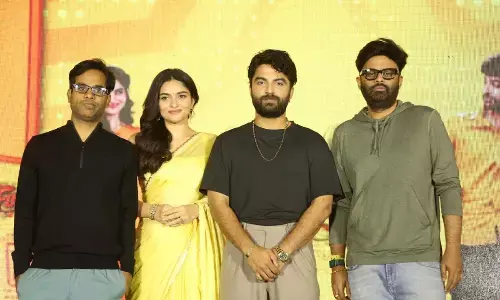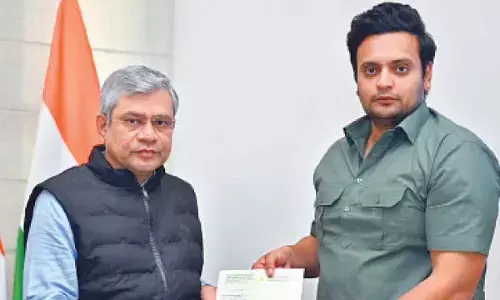Colossus an actor: reminiscences

Colossus an actor: reminiscences. The necromancer (maantrikudu) in ‘Pathala Bhairavi’ (1951) wearing costumes reminiscent of a Shakespearian anti-hero and uttering on and off the dubiously stimulating words ‘Sahasamsayara Dimbhaka’ was instantly accepted and adoured by Telugu and Tamil audiences alike.
“To grasp the full significance of life is the actor's duty;
to interpret it is his problem; and to express it his dedication.”
- James Dean
.jpg) The necromancer (maantrikudu) in ‘Pathala Bhairavi’ (1951) wearing costumes reminiscent of a Shakespearian anti-hero and uttering on and off the dubiously stimulating words ‘Sahasamsayara Dimbhaka’ was instantly accepted and adoured by Telugu and Tamil audiences alike.
The necromancer (maantrikudu) in ‘Pathala Bhairavi’ (1951) wearing costumes reminiscent of a Shakespearian anti-hero and uttering on and off the dubiously stimulating words ‘Sahasamsayara Dimbhaka’ was instantly accepted and adoured by Telugu and Tamil audiences alike.
He played almost a similar role in ‘Bala Nagamma’ wherein he kidnaps the lead lady seeking sexual favours from her. The sorcerer drizzling out romantic overtones was a role not too easy to portray. But Ranga Rao etched out a performance wherein the character was hated and the player of the role was revered!
Playing the lead role in his first film ‘Varudhini’ (1946), SV Ranga Rao had to be idle for four years till he got the villain’s role in ‘Mana Desam’ (1949). Incidentally, ‘Mana Desam’, directed by the thespian LV Prasad, was also the first film of the legendary NTR.
Ranga Rao, hardly six years senior to ANR by age, played father to the latter in the highly celebrated ‘Devadasu’, released in 1953.
SVR played Emperor Akbar in ‘Anarkali’ (1955) wherein ANR was again his son Salim. ‘Anarkali’ was produced by the distinguished heroine of those days Anjali Devi with herself as the lead lady.
.jpg) ‘Missamma’ from Vijaya Productions was also released in 1955. All the films were smash hits.
‘Missamma’ from Vijaya Productions was also released in 1955. All the films were smash hits.
In 1957, ‘Maya Bazar’ was released. The film was a cleverly darned corpus of anecdotes from the great epic the Mahabharata. Ranga Rao played the benevolent wizard ‘Ghatotkacha’, born to Bheema and Hidimbi.
The song “Vivaha Bhojanambu… VinthainaVantakambu” is an all-time rage filmed on Ranga Rao while he devours loads of delicious eatables. And no wonder, ‘Maya Bazar’ was a record breaking hit at box office and reverentially viewed as a reference volume for film makers. KV Reddy directed the film.
It was not just coincidental that SVR portrayed literally every single ‘Raakshasa’ from the lore of Indian mythology. In fact, it was unthinkable for film makers to go for alternatives in place of Ranga Rao.
He was Kamsa, the maternal uncle of Lord Krishna in ‘Krishna Leelalu’ and ‘Yasoda Krishna’. The latter released in 1974 was his last film in Telugu.
He was Ravana in ‘Sampoorna Ramayanam’ (1971) made by the inimitable Bapu. The grandiose monologue accomplished by SV Ranga Rao towards the climax of the film is greatly admired even today.
.jpg) ‘Pandava Vanavasam’ (1965), has a similar sequence where Ranga Rao as Duryodhana resorts to self-recrimination through the lines “Neeku Maraname Melu… Avunu… Maraname Melu”. With a unique glint of the eye and twirl of the lip, Ranga Rao could convey all the quintessential jealousy and megalomania of Duryodhana.
‘Pandava Vanavasam’ (1965), has a similar sequence where Ranga Rao as Duryodhana resorts to self-recrimination through the lines “Neeku Maraname Melu… Avunu… Maraname Melu”. With a unique glint of the eye and twirl of the lip, Ranga Rao could convey all the quintessential jealousy and megalomania of Duryodhana.
The role of Keechaka in ‘Narthana Sala’ (1963) brought him accolades from beyond the borders of the nation. He was chosen the Best Actor for the role at the 1964 Indonesian International Film Festival, Jakarta. The role also fetched him a national award in India.
Ranga Rao portrayed Hiranyakashipu, the father of Prahalada, with unparalleled aplomb in AVM’s ‘Bhakta Prahlada’ (1967). The anguish of a doting father as his only son becoming a devotee of the arch rival was delineated in a manner singularly possible for the inimitable Ranga Rao.
He was Daksha, the father of Parvathi in ‘DakshaYagnam’, Harischandra (a film by the same name made by Rajyam Pictures), Yama in ‘Sati Savithri’ and Mayasura in AVM’s ‘Bhookailas’.
Effortlessness in delivering the dialogue was Ranga Rao’s forte. The ease, bordering on a measured recklessness aptly suited the DNA of the negative roles he played. All the way, it was versatility at its peak.
A leading film personality, who was a contemporary to Ranga Rao in many films, reportedly quipped that Telugu and Tamil audiences are lucky to have Ranga Rao acting for them and it is SVR’s misfortunate that he was not born in the West where he could have gained global fame and recognition.
Ranga Rao played numerous roles as a generous and doting father and performed in matchless way. ‘Athma Bandhuvu’, ‘Velugu Needalu’, ‘Dasara Bullodu’, ‘Gundamma Katha’, ‘Ramudu Bheemudu’ are just a few samples for his multidimensional talent. In ‘Pandanti Kapuram’ (1972), he played the tormented eldest brother of a joint family trying to bind a crumbling family. The song “BabooVinara…. Anna Dammula Katha Okati…..” haunted the Telugu cultural milieu for long.
In ‘Tata Manavadu’ the same year, he played the neglected grandfather to Raja Babu; the maiden directorial venture for Dasari Narayana Rao, was a smash hit.
SVR, in pleasant contrast to the mighty mythological personalities he enacted, also acted in soft-hearted and even humorous roles like the one in ‘SambaralaRambabu’. He was the helpless husband of a raucous wife (mostly Suryakantham) in films like ‘Dasara Bullodu’.
As though for a change, Ranga Rao played rowdy in films like ‘Kattula Rattaiah’ and ‘Jagat Jentrylu’ uttering catchphrases like “Ghootley” and “Dongrey” to the delight of the front rows in movie theatres, amidst whistles and screams.
In all, he acted in about 150 Telugu films and 90 Tamil films. Films like ‘Missamma’, ‘Pathala Bhairavi’ and ‘Chandi Raani’ were bilingual ventures. ‘Nan Oru Penn’ was remade by Ranga Rao as producer into Telugu as ‘Naadi Aada Janme’ in 1965. The Tamil version brought him a National Award. SVR was a treasured favorite to Tamil audiences and assimilated with fanfare as much as he was venerated by the Telugu speaking people.
He donned the megaphone and directed two Telugu films, ‘Chadarangam’ and ‘Bandhavyalu’, based on family oriented subjects and both the films were awarded by the AP Government.
Born at Nuzividu in Krishna District on July 3, 1918, Ranga Rao was a graduate in Sciences. He breathed his last on July 18 1974 in Chennai. He was hardly 56 when he passed away.











